Max Euwe - The Genius of Order
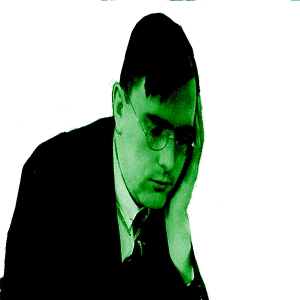
Max Euwe
He was one of the last great chess players of the amateur era. Chess was a pastime, not a career. If he would have dedicated his life absolutely to chess in the same way as some of his contemporaries, maybe he would have had more than two years as World Champion, following his victory over Alexander Alekhine. If anything, winning the World Championship as a part-timer against dedicated professionals should make him all the more respected.
Euwe was also a prolific chess author, turning out 70 chess books over the years. He made huge contributions to opening theory. He was also FIDE President for most of the 1970s. His main achievement in this time was to make sure the Match of the Century in 1972 went ahead.
Young Max
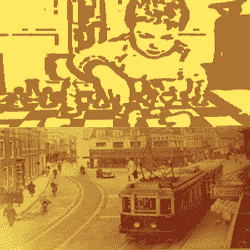
Young Max quickly became a talented chess player
He took part in his first competition at the age of 10 in Amsterdam. It was a one day event and Max won every game. He also did very well in school and found that he excelled in mathematics in particular.
His huge interest in mathematics would complement his love for chess and he would combine both of these talents throughout his life, using each at times as a medium to work with the other. Mathematics would form the basis for his professional life. Chess would exist as the perfect pastime and he developed a great passion for it.
Mathematical Career
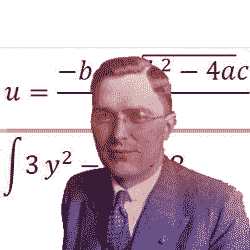
Max Euwe was a brilliant mathematician
Chess would soon play a small part in his professional life. He published a mathematical analysis of chess from an intuitionist point of view. He showed that the official rules, such as they were then, did not eliminate the possibility of infinite games.
He did this using the Thue-Morse sequence which uses a binary code. Intuitionism declares that a mathematical object only exists if a method to construct it can be given. In Euwe's test, the blueprint for a conclusion by force to a chess game could not be constructed. New rules such as the 50 move rule were introduced to rectify the shortcomings uncovered by Euwe's findings.
Early Chess Years
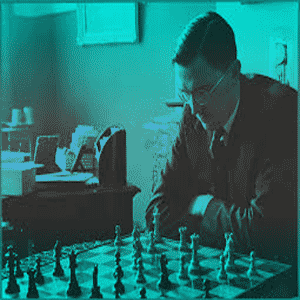
Max Euwe quickly took a stranglehold on Dutch chess
He was on an upward trajectory in world chess too. He was playing against the top players in high level tournaments throughout the 1920s, such as London 1922 and Ostrava 1923. Even though he never put his chess ambition before his career, his results were showing a slow but steady improvement.
He had a systematic, methodical approach to chess just as he had to everything else in life. His outlook was coming across in his game as it does with everyone. Towards the end of the 20s, his match results against other prominent players were beginning to mark him out as a force to be reckoned with.
He lost narrowly, 3-2 (5 draws), against Alexander Alekhine in Amsterdam in 1926, only losing the match in the last game. His results against other top players indicated that he was worthy of their company. It also showed that his chess strength was improving continuously.
Euwe vs Bogoljubov
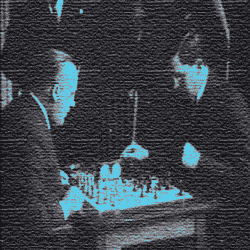
Efim Bogoljubov scored 2 narrow wins over Max Euwe
By 1928 the new World Champion, Alekhine, recognized the growing credibility of this new organization, FIDE (Fédération Internationale des Échecs (International Chess Federation)). He accepted the FIDE Champions as the natural challengers for his title.
Euwe played the first two FIDE Championship matches against Efim Bogoljubov, losing +2−3=5 in 1928 and +1−2=7 in 1928/29. Bogoljubov's most famous quote was, When I am White, I win because I am White. When I am Black, I win because I am Bogoljubov! If you're going to be successful, modesty can be an early casualty!
Bogoljubov would later face Alekhine for the World Championship in 1929 and 1934, losing both times.
Euwe vs Capablanca

Jose Raul Capablanca edged out Max Euwe in a tight encounter
Alekhine was making it difficult for Capablanca to get a shot. He stipulated a match stake of $10,000, a phenomenal amount of money at the time. There were also a string of other conditions.
It seemed as if Alekhine would prefer not to face Capablanca. The Cuban decided one practical thing he could do to build pressure for a rematch would be to beat all of the other contenders.
Capablanca traveled to Amsterdam to face Euwe in a match in 1931. Euwe was beaten 2-0 (8 draws) by the Human Chess Machine who was still playing great chess. These results were showing that Euwe was getting close to the standard required however. He just needed to get a little stronger.
Euwe vs Flohr
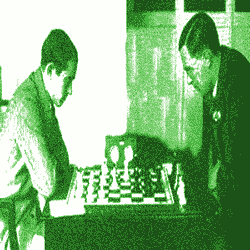
Max Euwe and Salo Flohr played out a draw in the early 30s
Flohr was a formidable Czech Grandmaster who saw his best chess years in the 1930s. He was a positional chess player of some repute and an excellent endgame player in particular.
The match was played in two cities. Amsterdam, Holland and Carlsbad, Germany. It was very close all the way through, never more than a point between them at any time.
It finished all square in the end, 3-3 (10 draws). This was followed up with strong showings at Bern 1932 and Zurich 1934. After Bogoljubov's second unsuccessful attempt to beat Alekhine, Euwe's challenge was accepted. He was deemed a preferable opponent to Capablanca.
World Championship Challenge
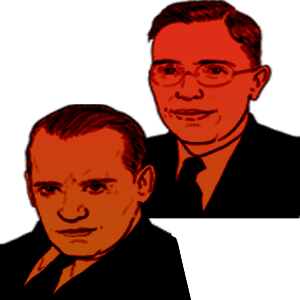
Alexander Alekhine accepted a World Championship challenge from Max Euwe
Kmoch urged Euwe to challenge Alekhine for the title. Euwe was reluctant but Kmoch persisted. In the end he managed to convince him to go for it.
Euwe later said of it, At that point the decision had in fact been made. I would challenge Alekhine for the World Championship! This decision didn't happen by chance, it was preordained. Alekhine accepted the challenge and the match was arranged for the following year in Euwe's home country.
Euwe vs Alekhine
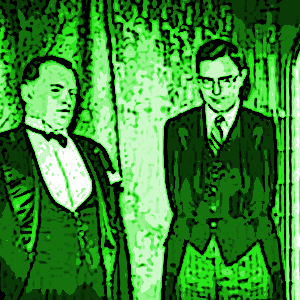
Max Euwe borrowed the World Championship from Alexander Alekhine for 2 years
Alekhine said that he would easily win and there were not many to argue with him. He did not really prepare for the match and drank heavily throughout. In contrast the Maths professor Euwe prepared meticulously and played diligently.
It seemed that Alekhine was falling into the same trap of complacency as Capablanca had eight years previously. Although he led 5-2 at one stage Euwe finished strong and beat him 9-8 (13 draws) to take the title.
The Rematch

Alexander Alekhine regained the World Championship from Max Euwe in 1937
Euwe's innate sense of fairness and gentlemanly conduct meant that there was no question of the former champion not getting a rematch. The rematch was scheduled for 1937, again to be played in Holland. In the meantime he finished 3rd at Nottingham 1936 ahead of Alekhine.
Alekhine immediately gave up the alcohol and went back into serious training. The second match was keenly contested in the early stages. Alekhine found another gear as the match progressed and powered away to victory winning 10-4 (11 draws). He was World Champion again.
Later Years in Chess
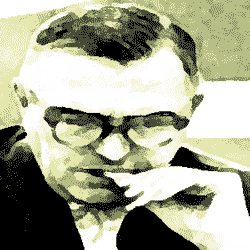
Max Euwe competed until the early 1960s before becoming a professor
It was a sign of things to come as Euwe was at the beginning of a slide out of the top tier. Over the next few years these newcomers like Keres, Botvinnik, Smyslov and Reshevsky were taking over the mantle from the old guard.
Euwe was finding it harder and harder to match the new generation. His last hurrah came in the 1948 World Championship when he and the four just mentioned faced off on a league basis for the title left vacant after Alekhine's death. Botvinnik finished top of the table to claim the crown. Euwe finished a disappointing 5th. He was 2nd from bottom at the Candidates Tournament in Zurich, 1953 in his final involvement in serious chess.
FIDE President
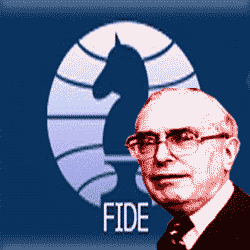
Max Euwe was FIDE President from 1970-78
He resisted Soviet attempts to influence FIDE according to their political machinations. This was at a time when the USSR was, along with the USA, a huge world superpower. It was also by far the biggest source of revenue to FIDE and a sizeable contingent of the world's strongest players were Soviets.
Euwe was instrumental in paving the way to the Match of the Century between Bobby Fischer and Boris Spassky when Soviet posturing was threatening the match. He also made sure Viktor Korchnoi would be able to play Anatoly Karpov in 1978 in the face of vehement Soviet objections following Korchnoi's defection.
He was not however successful in satisfying Fischer's concerns to see the 1975 World Championship showdown against Karpov go ahead.
Euwe Legacy
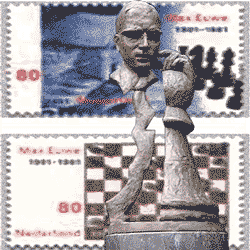
Max Euwe has been honored with stamps and statues in his native Holland
That he could win the title as a part-timer against full-time opponents only makes you wonder how good he might have been if he gave the game his undivided attention. The lack of time and attention he gave to professional chess has resulted in a lack of historical recognition.
Euwe's background in mathematics means it's no surprise that he took a level-headed scientific approach to chess. He played with a systematic positional style. Euwe was the great chess logician.
But for all that he could display remarkable creative genius. He had great powers of calculations and no fear whatsoever of engaging in complicated tactical exchanges.
Moving On
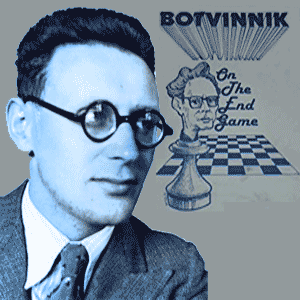
Mikhail Botvinnik
He was a disciple of ruthless logic, though not necessarily the KISS method of keeping it simple. He was not afraid to wade into sharp complications, his mathematical acumen bestowing him with the deep calculation skills required for such things.
He only held the World Championship for two years, losing it to the same man he took it from. When his nemesis died while still holding the title, Euwe was one of five players to compete in a league format for the vacant title in 1948. Alas he was well past his best and finished bottom of the table. The title was seized by Mikhail Botvinnik.






